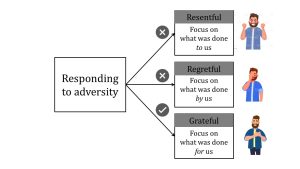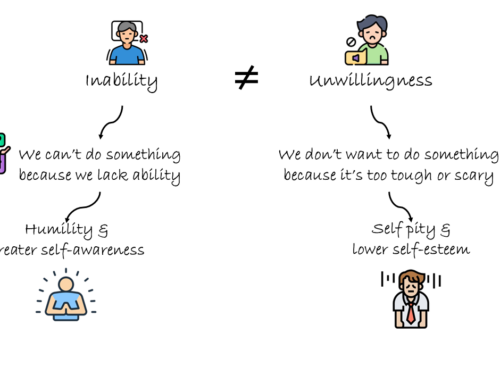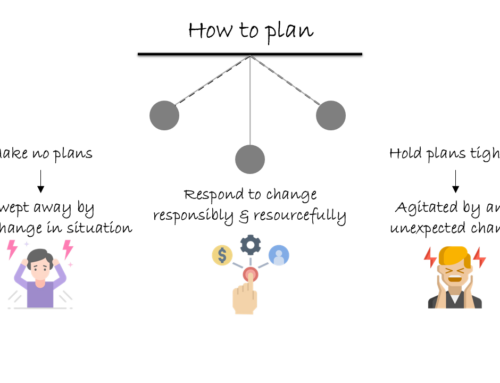 When adversity befalls us, we don’t have much choice about what has already happened. But we do have a choice about how we respond. Our response usually ranges over three broad categories.
When adversity befalls us, we don’t have much choice about what has already happened. But we do have a choice about how we respond. Our response usually ranges over three broad categories.
Resentful: Herein, we feel angry about what was done to us, about how the world is treating us so terribly. If we feel that the adversity was caused by a specific person, our resentfulness may transmogrify into revengefulness. Railing at externals rarely changes those externals for the better; to the contrary, it frequently changes our internals for the worse — it leaves us feeling powerless, helpless, hopeless.
Regretful: Herein, we obsess over what was done by us. Feeling regret for our actions is better than feeling resentful toward the world. Why? Because working at changing ourselves can be constructive; getting worked up about why the world is not changing itself to treat us better is rarely constructive. While regretting specific mistakes or misdeeds can be helpful, it’s harmful to feel regretful in the sense of being constantly full of nothing but regret. When we are regretful, we let regret dominate our consciousness and define our negative self-conception. Consequently, we beat ourselves up relentlessly, thereby sabotaging our capacity to respond to adversity constructively. Pertinently, the Bhagavad-gita cautions against such self-destructive thought-patterns (18.35).
Grateful: Herein, we focus on what was done for us. We may visualize how the adversity could have been much worse and how factors beyond us prevented such worst-case scenarios. If such visualization is too difficult or disturbing, we may recollect the good things that have happened to us during the course of life — the occasions when we received undeserved good fortune or, in common parlance, we got lucky breaks. The resulting positive emotion and energy can empower us to deal with that adversity more constructively.
One-sentence summary:
To face adversity constructively, be not resentful about what was done to us; be not regretful about what was done by us; be grateful about what was done for us.
Think it over:
- What’s wrong with being resentful amid adversity?
- Regretting our actions is helpful, being regretful isn’t — explain.
- Amid adversity, how can we feel grateful? How can such a feeling help?
***
18.35: And that determination which cannot go beyond dreaming, fearfulness, lamentation, moroseness and illusion – such unintelligent determination, O son of Prutha, is in the mode of darkness.
To know more about this verse, please click on the image






Thank you for this morning’s Gita
I read it just after my preyer time and chanting and it was so relevant to what came up in my mind while giving prey.
Even though I thought I was a good servant to all my jobs over some 50 years
I stole small things from the businesses like screws windex felt like a compulsive disorder ;( And in thinking this I can see how I may have fallen from Krishna Grace as a fallen soul from the Spiritual Sky
Hare Krishna
A Servant of a servant of a servant
Thanks for your candor in sharing – all the best.
🙏🏻🙏🏻🙏🙏🙏 Hare Krishna
Very Logical. May lord Krishna continue to bless with the similar wisdom. Thanks .
Happy to be of service.
Gratefulness is a thing of past
Let’s hope not.